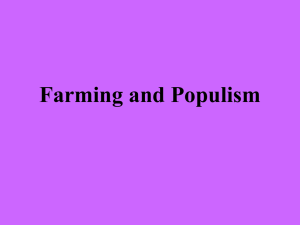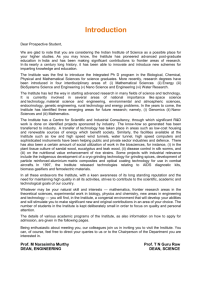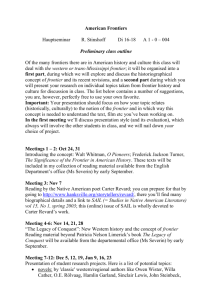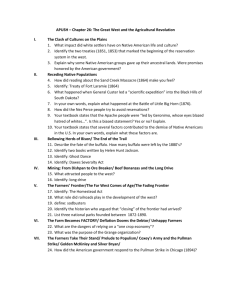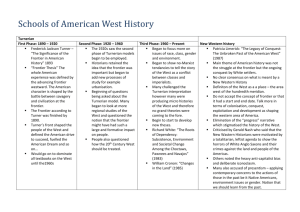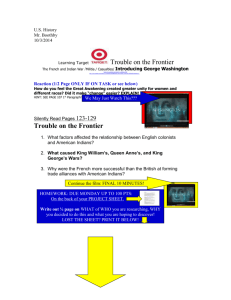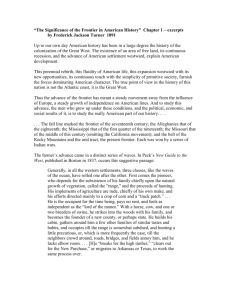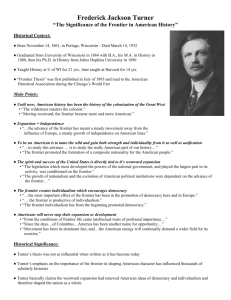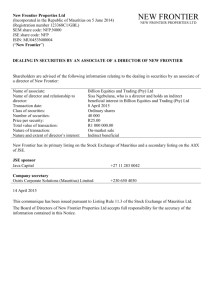Syllabus
advertisement
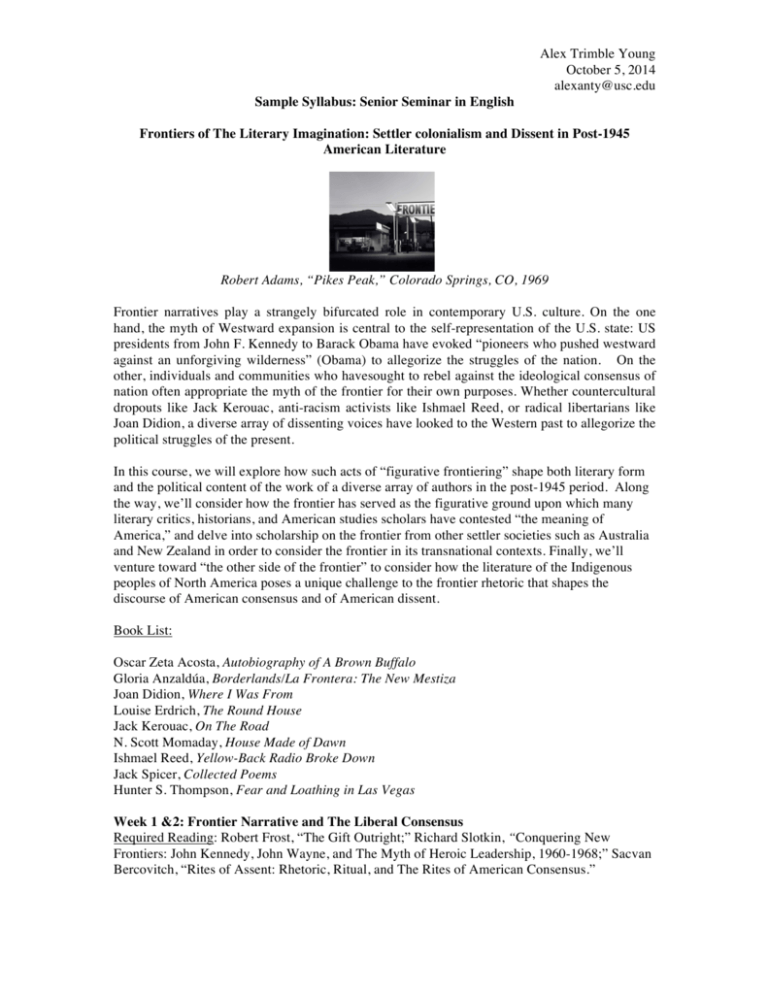
Alex Trimble Young October 5, 2014 alexanty@usc.edu Sample Syllabus: Senior Seminar in English Frontiers of The Literary Imagination: Settler colonialism and Dissent in Post-1945 American Literature Robert Adams, “Pikes Peak,” Colorado Springs, CO, 1969 Frontier narratives play a strangely bifurcated role in contemporary U.S. culture. On the one hand, the myth of Westward expansion is central to the self-representation of the U.S. state: US presidents from John F. Kennedy to Barack Obama have evoked “pioneers who pushed westward against an unforgiving wilderness” (Obama) to allegorize the struggles of the nation. On the other, individuals and communities who havesought to rebel against the ideological consensus of nation often appropriate the myth of the frontier for their own purposes. Whether countercultural dropouts like Jack Kerouac, anti-racism activists like Ishmael Reed, or radical libertarians like Joan Didion, a diverse array of dissenting voices have looked to the Western past to allegorize the political struggles of the present. In this course, we will explore how such acts of “figurative frontiering” shape both literary form and the political content of the work of a diverse array of authors in the post-1945 period. Along the way, we’ll consider how the frontier has served as the figurative ground upon which many literary critics, historians, and American studies scholars have contested “the meaning of America,” and delve into scholarship on the frontier from other settler societies such as Australia and New Zealand in order to consider the frontier in its transnational contexts. Finally, we’ll venture toward “the other side of the frontier” to consider how the literature of the Indigenous peoples of North America poses a unique challenge to the frontier rhetoric that shapes the discourse of American consensus and of American dissent. Book List: Oscar Zeta Acosta, Autobiography of A Brown Buffalo Gloria Anzaldúa, Borderlands/La Frontera: The New Mestiza Joan Didion, Where I Was From Louise Erdrich, The Round House Jack Kerouac, On The Road N. Scott Momaday, House Made of Dawn Ishmael Reed, Yellow-Back Radio Broke Down Jack Spicer, Collected Poems Hunter S. Thompson, Fear and Loathing in Las Vegas Week 1 &2: Frontier Narrative and The Liberal Consensus Required Reading: Robert Frost, “The Gift Outright;” Richard Slotkin, “Conquering New Frontiers: John Kennedy, John Wayne, and The Myth of Heroic Leadership, 1960-1968;” Sacvan Bercovitch, “Rites of Assent: Rhetoric, Ritual, and The Rites of American Consensus.” Alex Trimble Young October 5, 2014 alexanty@usc.edu Week 3: Jack Kerouac’s Fellaheen Frontier Required Reading: Jack Kerouac, On The Road; Frederick Jackson Turner, “The Significance of The Frontier in American History.” Week 4: Race and The Countercultural Frontier Required Reading: Norman Mailer, “The White Negro;” James Baldwin, “The Black Boy Looks at the White Boy;” Manuel Luis Martinez, “‘With Imperious Eye’: Kerouac’s Fellaheen Western.” Week 5&6: Settler Colonial Studies and the Transnational Frontier Required Reading: Patrick Wolfe, “Land, Labor, and Difference: Elementary Structures of Race;” Lorenzo Veracini, Settler Colonialism: A Theoretical Introduction (excerpt); Margaret Jacobs, “Comparative Settler Colonialism and the History of the American West;” Film: Nick Cave, The Proposition Week 7: Spicer’s Queer Frontier Required Reading: Jack Spicer, “Psychoanalysis: an Elegy;” Billy The Kid, and The Book of Magazine Verse; Leslie Fiedler, The Return of The Vanishing American (excerpt); Joseph Boone, “Introduction: Queer Frontiers.” Week 8: A Decolonial Western? Ishmael Reed and The Countercultural Frontier Required Reading: Ishmael Reed, “The Feral Pioneers,” Yellow-back Radio Broke Down, “God Made Alaska for The Indians.” Week 9: Joad Didion’s Frontier Pragmatism Required Reading: Joan Didion, “On Morality,” “Slouching Toward Bethlehem,” Where I Was From. Week 10: Gloria Anzaldúa’s Queer Borderlands Required Reading: Gloria Anzaldúa, Borderlands/La Frontera: The New Mestiza; Kerwin Klein, Frontiers of The Historical Imagination (excerpt). Week 11: Hunter S Thompson’s Reverse Western Required Reading: Hunter S. Thompson, Fear and Loathing in Las Vegas, “The Battle for Aspen.” Week 12: Oscar Zeta Acosta, Mestizaje and The Countercultural Cowboy Required Reading: Oscar Zeta Acosta, Autobiography of A Brown Buffalo; Ben Olguin, “Caballeros and Indians: Mexican American Whiteness, Hegemonic Mestizaje, and Ambivalent Indigeneity in Proto-Chicana/o Autobiographical Discourse, 1858–2008” Week 13: Looking East: N. Scott Momaday and The New Frontier Required Reading: N. Scott Momaday, House Made of Dawn, “The Morality of Indian Hating” Week 14: Louise Erdrich and Indigenous Alternatives to the Logic of Elimination Required Reading: Louise Erdrich, The Round House; Jodi Byrd, “Follow The Typical Signs: Settler Sovereignty and Its Discontents.”
